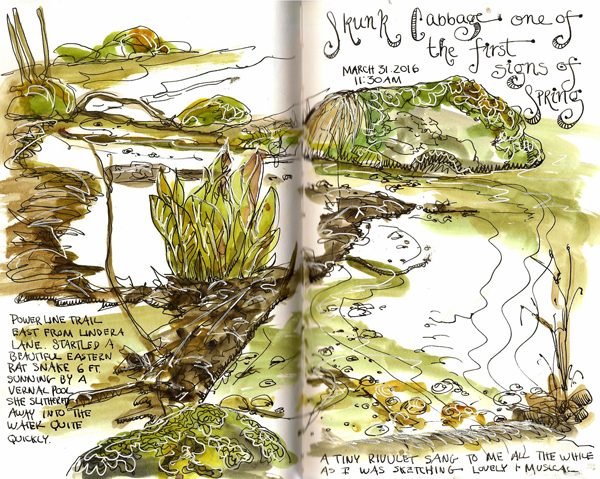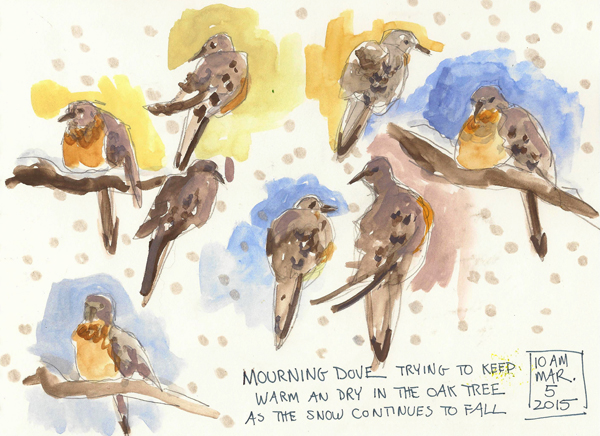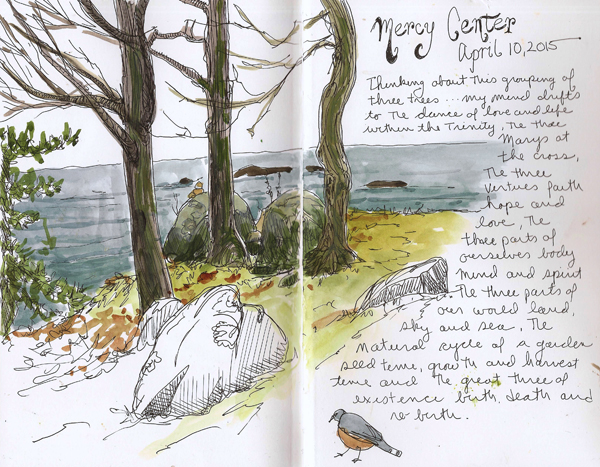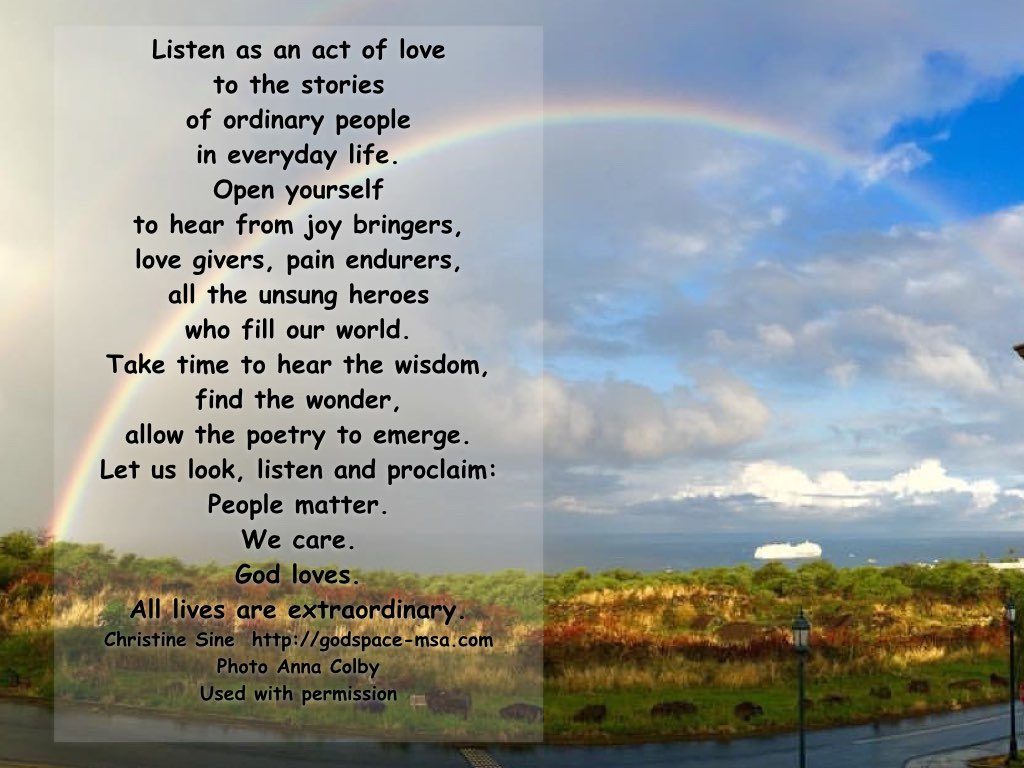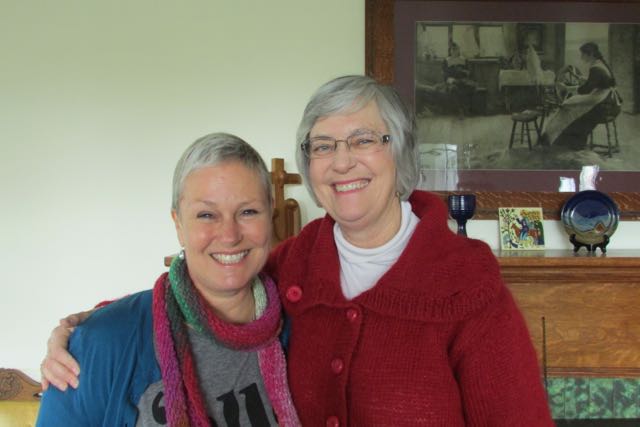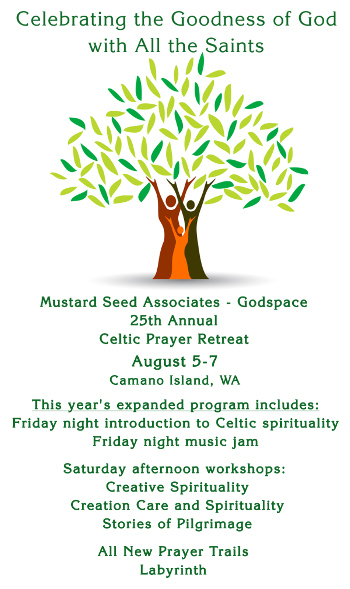By Jan Blencowe
Do stones speak? Do they listen? I have always been intrigued by Jesus’ words as he enters Jerusalem “if they keep quiet, the stones will cry out.” In the book of Joshua, we read “This stone…. has heard all the words the Lord has said to us.” Stones speaking and listening. Fascinating.
These are metaphors of course, employed to underscore a point. However, metaphors often unearth a truth deeper than what is apprehended on the surface, which is why they are so useful.
Silent time in nature is a necessity for me. Thoughts of stones speaking and listening, and trees chanting psalms and clapping their hands, water the garden of my imagination as I settle into fertile reverie in the woods, sensing that I am indeed surrounded by speaking stones and clapping trees. Nature has been commissioned by her Creator to illuminate and instruct. I sit at her feet and eagerly listen.
I keep a nature journal to record the wonders I see and hear. Each day is an adventure. I don’t go far, usually just into the woods at the back of our property. There is a break in an old stone wall and that for me is a threshold. Stepping through is a ritual of crossing over. One footstep beyond the wall and I fall silent. In the woods, I will look, I will listen, I will touch and smell, but now only the earth will speak. It is amazing what lessons your heart will learn by keeping silent and listening in the woods.
Legend says that St. Francis preached a sermon to the birds, and I have often thought that the birds have returned the favor to humankind. I’ve had a bird preach a sermon or two to me. In our woods I often hear Mourning Doves. It is typically the unmated male who makes the mournful coo-oo followed by two or three louder coos. When I listen to this sad sounding song of the lonely bachelor dove, I am reminded that we are made to live in community and that there is great joy and delight in a soul-mate.
Sitting by a stream, as it bubbles along, fresh and fast, fed by snow melt and spring rains, I listen. My ears hear a music that delights the senses. My heart hears the wisdom of Heraclitus who mused “No man ever steps in the same river twice, for it’s not the same river and he’s not the same man.” I am reminded of the constancy of change in our lives and our call to transformation. Change can be difficult, it can be frightening and can often spark resistance. Yet, in its constant state of change the stream is beautiful and it’s sound is magical. It occurs to me that perhaps it is lovely to look upon and delightful to hear only because its waters flow and the stream itself embraces the wisdom of movement and change.
In our woods there are two very tall beech trees. As skinny, awkward young saplings they suffered the unfortunate circumstance of having sprung up very close to each other. As they grew they stretched and competed for sunlight. Their circumferences enlarged until eventually the two tree trunks touched. As they continued to grow their trunks flattened as they pressed against each other. Now instead of smooth and round their trunks are badly misshapen. With every breeze the two beech trees sway. Their trunks grind and scrap against each other and they emit a sound that can only be described as painful. During storms when the winds are fierce the moans and groans of the two trees can be heard all the way back at the house. From them I have learned a painful lesson. Sometimes we find ourselves in a relationship that is too close. We are pressed to tightly into someone else. We are unable to grow and mature into the rounded fullness we are meant for. We are either dependent or desperately needed in an unhealthy way. Eventually, we become stunted and misshapen, and our souls are in pain and groan. Trees are rooted to the earth. They cannot simply move away from each other to gain the sun, air and space they need to truly thrive. We, however, do have the ability to move away from unhealthy relationships and seek out the space we need for our hearts and souls to flourish.
How loving and wise it is that we should possess the ability to imaginatively listen to nature and learn lessons of the soul. How beautiful and gentle a teacher nature is for us when we cultivate a heart to listen.
Jan Blencowe earned her BFA in 1984 from Caldwell College. She has enjoyed a long career as a successful landscape painter, but her most profound joy is keeping a personal sketchbook of her life experiences. The boldness of an ink line on paper and the use of free flowing water media allow her to engage life’s moments both great and small with gratitude, and presence. Her deepest connection is with the natural world and she makes a regular practice of sketching the ongoing drama of life that unfolds at the beaver pond on her property in Clinton, Connecticut, and throughout New England’s woods and marshes. Her nature journal sketches are featured in several books on sketching outdoors and in interdisciplinary science curriculums.
Her sketching and nature journaling can be found at: Jan Blencowe Sketchbook.
By Andy Wade –
His name was Bert, a Native American from the Duwamish (The Dkhw’Duw’Absh) tribe whose home was the streets of Seattle. The year was 1980 and I was a bright-eyed nineteen year-old Evangelical sitting across from Bert and his friend, Clyde, all ready to share the Gospel with these two poor, homeless guys. My agenda was clear: I needed to share the gospel and make sure these folks got saved.
What actually unfolded was quite different than what I had planned. As I talked (I wasn’t really into asking questions other than those scripted by the goal), they both politely nodded in agreement. Every once in a while either Bert or Clyde would chime in with a bit of relevant gospel. Over several weekly visits, tucked into my monologue as minor interruptions to the script, I would completely miss these little gems of wisdom.
Then, one night, God showed up. As I was flinging Bible verses around like a good sower scatters seed (so I thought), Bert pulled out his well-worn Bible, opened it up, and began to teach me. Staring at me with his one good eye, Bert proceeded to rattle off an entire passage of scripture, the one open in front of him, without looking at it once. I was dumbfounded… literally!
The truth of the matter was that God had been showing up for weeks, but I was unable, or unwilling, to listen. Whether Bert and Clyde knew it or not, God was using them to save me, not the other way around. Both of them had a very deep faith. Both of them were rich in wisdom. And I had written both of them off as old homeless guys who needed saving.
Perhaps one of the biggest challenges to listening are our prejudices and preconceived notions. When you amplify that with privilege and arrogance, our ears can become as stopped up as a toilet at a bad fast-food joint. At the time, I really had no idea how full of it I was.
As God plunged my ear canals and I began to be able to hear, Bert educated me not only about the Bible but also about the challenges of being a Duwamish Indian, a tribe unrecognized by the Federal government.
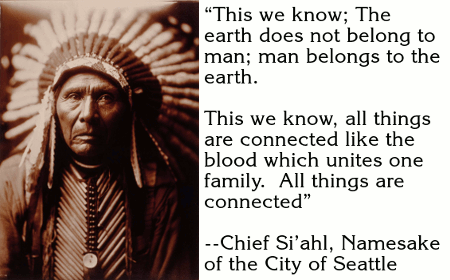 I learned that these “lazy, drunk Indians”, as they were often stereotyped, were actually very proud Native Americans robbed of their home while their culture, and very existence, were daily assaulted by the forces of assimilation and “economic progress”. (The city of Seattle is named after one of the Dkhw’Duw’Absh Chiefs, Chief Si’ah, the first signatory of the 1855 Treaty of Point Elliot which ceeded their lands for the very benefits they are denied today). Although he never said it, my whole middle-class-white-American Evangelical approach was more a symptom of that oppression than of the unfettered grace of God.
I learned that these “lazy, drunk Indians”, as they were often stereotyped, were actually very proud Native Americans robbed of their home while their culture, and very existence, were daily assaulted by the forces of assimilation and “economic progress”. (The city of Seattle is named after one of the Dkhw’Duw’Absh Chiefs, Chief Si’ah, the first signatory of the 1855 Treaty of Point Elliot which ceeded their lands for the very benefits they are denied today). Although he never said it, my whole middle-class-white-American Evangelical approach was more a symptom of that oppression than of the unfettered grace of God.
Still reeling from the shattering of my dominant views, I listened as Clyde began to unfold the story of his life. For several decades Clyde was a faithful employee of a flour mill in South Seattle. Then one day, in his late 50s, he was suddenly laid off. Searching for work but finding none, Clyde eventually lost his housing and landed on the street. He spent his days with Bert in the library reading and, to this date, is probably one of the most well-read people I’ve ever met.
I did not go to the streets of Seattle to hear; I went to speak. I did not go to the streets of Seattle to see, but to confirm what I had already preconceived in my mind. Bert and Clyde shattered the darkness shrouding my heart and mind. God used them to unstop my ears and to open my eyes. Over the past 35 years I have continued to be involved in the lives of the unhoused, or should I say, we’ve been involved in each other’s lives. Thanks to these two prophets of God, this has largely been a partnership with, rather than a ministry to, or for, those living outside.
I still see through a glass darkly and my ears still are partially clogged. To think differently would be to deny Clyde and Bert’s ministry to me. But they have taught me to listen, to be more aware, and to recognize that, in the many voices around me every day, there are prophets still speaking, calling us forward, and readily available to those who have ears to hear.
- Can you think of a time when God broke through your own prejudice or preconceived notions to help you to see and hear more fully?
- Can you identify one or two areas in your life where you still have trouble hearing and seeing?
When Denise and I were on our honeymoon in Ireland (May 2014) I took this picture of Saint Tola’s Cross near Dysert O’Dea Castle. At the top is a fully clothed crucified Christ. Below this is a carving of what is believed to be Bishop/Saint Tola with a pointed mitre. He founded the monastery around 700 CE near the present castle. The cross was erected in the 11th or 12th century. This was my second trip to Ireland and this time I was able to explore the land more fully than before (twelve days versus four). We both fell in love with Ireland, her people, the landscapes, and the history. In many ways it was hard to leave when our visit was over.
If we felt that way after ten days, I can’t even imagine how Columba and his band of twelve felt as they watched their beloved Ireland fade into the distance as they made their way across the sea to what we now know as Scotland. The reasons for his departure are shrouded in mystery as most of the lives of these early saints are. If you want a very good book with exceptional study and insight into Columba and the story of Iona, Ian Bradley’s “Columba: Pilgrim and Penitent” is a great source.
As I read the various stories about Columba from Bradley and other sources, I was struck by the complexity of the man who some say should have been the Patron Saint of Scotland. Here was a monk who had royal blood flowing through his veins. During his time as the Abbot of Iona, Columba was a diplomat, politician, abbot, and priest. He moved in and out of the political arena (with the aim of stopping the bloodshed which ultimately hurt poor folks the most, as it does still today) and seemed to balance the monk and the warrior-aristocrat within.
The emphasis of Columba’s ministry and the monastic ministry of his time was not simply being isolated from the world and saying your daily prayers. Praying the Daily Office, Celebrating Mass, and copying holy books in the Scriptorium were a very important part of their vocation. Examples of the fine work of these Irish monks are with us today in the Book of Kells and the Book of Durrow (which are both housed in the Library of Trinity College in Dublin). However, the ministries of hospitality and presence were equally important in their vocational life.
Ministry of Presence for them was being with the people, not by proselytizing and preaching like so many do today, but by simply being there with the people. Monastic communities were a place of safety and refuge, as well as a place of spiritual and physical care. In Columba’s day, you didn’t build monuments to yourself (thinly veiled as, “oh but we are doing this for the glory of God”), you lived and worshipped in simple, functional spaces. Their huts and churches were built from wood and mud or stone. They were built to be functional, not ostentatious. That was because the monk and the monastic community’s primary duty was to be present to God and present to neighbor.
Continuing to reflect on Columba, I found myself thinking about my own vocation as a military chaplain and now a pastor. In the Air Force Chaplain Corps we had two phrases that were supposed to be touchstones for us. The first was “Ministry of Presence” and the second was “A Visible Reminder of the Holy.” I am as comfortable worshipping in beautiful sanctuaries like the one in the church where I am now serving as pastor (Presbyterian Community Church of the Rockies in Estes Park, Colorado), in an Eleventh Century Church (St Mary’s Parish Church in Croughton, England), or outdoors or in a tent in the middle of nowhere (courtesy of deployments and training exercises with the military). The majority of my ministry was, and continues to be, simply being with and walking with people.
Columba reminds me that serving God is about loving God and loving neighbor. It is about doing justice, loving mercy/kindness, and walking humbly with God to paraphrase Micah 6:8. It is about being with God’s children (ALL of God’s children, not just the ones who think like you). It is about being that visible reminder of the holy.
Are you, dear reader, hearing the call? The call to live differently from the world and yet to live within it? The Christianity of Columba was not about detachment or escape from the world. It was grounded in prayer, Scripture (especially the Psalms which reveal the wide array of human emotions and interactions with God), and action. In the words of Bradley, “Columba calls the church to be political and prophetic, not by making easy moralistic statements but by costly engagement in the world.”
Columba challenges me to constantly re-evaluate my own life and ministry. He challenges me to dig deeper into the spiritual life and to walk boldly into the messiness of the world with the healing balm of Christ. Are you willing to let him challenge you?
Biblical spirituality says there is still a source that reveals the voice of the living God. It asserts that God is not done with the business of revelation and creation but instead continues to have something to say and something yet to be accomplished in the very culture that isn’t sure if God is done speaking. We have muted, muffled and, in some cases, silenced the voice of God because we have forgotten to listen in the ways and places where God’s voice has always been heard. I hope to recover a way of practicing spirituality that has been silenced for some because we have lost our listening; we need to re-create another way of listening. And I confess, I am not only a product of a culture that silenced the thunder of God’s voice; I have myself done it for others. I don’t sit in any seat outside looking in from a comfortable perch; I have helped to foster practices and a culture of silence.
In an earlier time of my life, there was a question that blared its answer on radio, TV, magazines, pulpits and talk shows across North America. Started as a question in academia, it soon was asked on street corners and in libraries, coffee shops and offices: “Is God dead?” Philosophers, theologians and curious on-lookers concluded yes. I listened in on the conversations too, and I wondered: Did God pass away in the night, or over the centuries as humankind outgrew our need for an all-powerful deity? Did God die because we found new technologies, medications and innovations to replace God as creator, healer and redeemer? It never seemed to me to be a question about God as much as about people. . . .
Even in Seattle, a city nourished by what I call REI spirituality, a coalition of environmentalism, social consciousness and tolerance for all differences, I still find a hunger for something that isn’t filled by our care of Mother Earth or the poor or certain other marginalized peoples. Perhaps the question in our day is no longer “Is God dead?” but “Where can God’s voice be heard?” Most people aren’t really fooled by the notion that humanity is all that exists, that humanity is the final answer to the questions asked across the centuries. I find that most people are hungry for something more, something deeper, something beyond. In my experience most people believe that God is alive, but they wonder if God has lost his voice. Sermons speak of almost everything except a continuing conversation with a living God. Books, articles, blogs and social media are full of the continuing search for the Spirit that has been our human quest from the beginning; we readily speak about God or for God when it seems our longing is to speak with God.
Where can God’s voice be heard today? Some say God’s voice can only be heard in the Bible, where the history of what God said is recorded, as if God cut off all communication after the early second century. Others believe God can only be heard in human-to-human relationships, as if the transcendent God of the ages can no longer speak for God’s own self. For some there is a notion that God can only be heard through educated and certified voices trained in special ways that authorize their words, as if God’s voice must be filtered through certain people. And some say that God can only be heard through rituals, liturgies or gatherings where particular forms contain the voice of God, as if God’s exclusive concern is with religion, worship, sermons, praise choruses and hymns.
You can tell that I’m not buying any of this because there was One who showed us another way to listen. His name was Yeshua, or Jesus as he is known to most of us. Early followers made outrageous claims that he not only spoke for God but he knew God and even was God wrapped up in a human body, which certainly complicates things. The entire weight of the Bible tilts the story to him. It says that Jesus knew something we need:
He was in the world,
the world was there through him,
and yet the world didn’t even notice.
He came to his own people,
but they didn’t want him.
But whoever did want him,
who believed he was who he claimed
and would do what he said,
He made to be their true selves,
their child-of-God selves. (John 1:10-12 The Message)
Jesus is the pattern or archetype of spirituality as it shapes people into our “child-of-God selves.” A teacher named Paul said, “He is the image of the invisible God, the firstborn of all creation. . . . For in him all the fullness of God was pleased to dwell” (Colossians 1:15, 19). Listening for the voice of God is not simply waiting for an audible voice; it is also spending time in the presence of the teacher, Jesus, whose teaching speaks loud enough for all of us to hear.
Today’s post is taken from chapter one, “Resonance” of Keith Anderson’s book The Spirituality of Listening.
By Andy Wade –
Sometimes we can’t listen because we won’t slow down. I wrote this poem several years ago but it seemed somehow appropriate for our series on listening.
If we take time to listen, we’ll find wisdom, wonder and poetry in the lives and stories of the people all around us…. we all want to know our lives have mattered and we won’t ever be forgotten…. listening is an act of love. Dave Islay Listening is an Act of Love.
This week as part of my reading discipline on listening I have delved into Dave Islay’s book Listening Is an Act of Love, in which he recounts some of the stories gathered through the Storycorps project, in which people across America were given the opportunity to share the stories of their lives.
As I read the book and watched the video below, I started to wonder: Where do I hear the stories of ordinary people in everyday life? As I sat and thought about this I realized it is mainly through Facebook. The sharing of joys and heartache, of family photos and garden beauty, the ask for prayers of healing, strength for the day, sustenance in the grief of death all speak of longing to have our stories acknowledged by others. We all want to know that our stories matter to others and to God.
The question is: how many of us truly listen. To be honest sometimes I am a little overwhelmed by what I read and I need to listen selectively, but I also want my friends to know that their lives do matter and I care about their stories.
Paying Attention to My Special Facebook Friend Niki.
One of the most beautiful and poignant stories I have followed on Facebook is that of the life and death of my friend Niki Foster Hibbert. When Niki was diagnosed with metastatic breast cancer in September 2014 she started a Facebook group Seasons of Grace, with the intention of posting 1,000 daily moments of her story and the grace of God in the midst of it.Niki and her family came to Seattle in April last year on a memory creating trip to Disneyland, as well as to visit many of her far flung Mercy Ship family. I relish that visit and the wonderful memories I will always have of Niki from it.
Sadly Niki only managed 556 of her hoped for 1,000 posts. On March 27th 2016 she breathed her last and went to be with the Lord. In her 555th post she said:
Sometimes God asks us to do hard things, things we get to mull on and ponder over and pray about. Sometimes hard things are just given to us, laid on our laps almost. No rhyme or reason, no instruction manual with 15 steps to follow, no emergency landing strip lighting the way and telling us where to go.
At times like this we often come to a cross-road in our life … And even more so, in our faith, a faith that was typified by being rock solid has had a wee shake, and with the shake come questions – unanswerable questions “Why?” Is there ever really an answer to that? I understand why people ask those questions, and sometimes I want to ask and sometimes I just don’t want to know what the answer is.
I guess for me the journey has always been about having enough grace for each day. I think it’s a little like God when he sent manna daily from heaven to feed Moses and the Israelites (Ex 16). It was a provision for that day only (apart from the day before the Sabbath when they had to gather enough for the Sabbath as well). This provision sustained and nourished them. It must have also confirmed to the Israelites that God remembered them, how could he forget! His eye was still upon them.
I think God’s grace is like that too. It is there for me, all I have to do is expect the provision from God and go get it. This journey is mine alone, and God’s grace is for me. There are lots of family and friends walking, kneeling, alongside me, but their journey is different, the grace that they need is different … they are not me. They need to draw on their own grace for each moment of each day, and I need my own portion too. Daily. Fresh grace every day, fresh manna every day. And the only one who can do that for us is our precious Heavenly Father. With outstretched arms he draws us to himself and tops our diminishing grace-tanks up, allowing us to refresh and restore, and then sending us on our way again, always keeping an eye on us.
Listening to a Legacy
When Niki died I thought I was done with listening to and learning from Niki’s life and to be honest I stopped reading Seasons of Grace. Then a couple of weeks ago I noticed her husband and daughter were posting. Post 601 had me weeping:
Today we were having a tidy up and I found a journal of mum’s. Like a lot of her journals we’ve found there was only one entry, 😉 but I was totally shocked at what was written in it. Mum’s death has been pretty hard for me to process because it all happened so quickly. She deteriorated so fast in her last few days that I never had an opportunity to ask any questions I wanted to before she could no longer communicate with us. I know that mum loved me but I have always wished that I could have asked her what she loved about me and what she thought of me, her daughter. In this journal entry mum talked about the unique love that she has for each member of our family and the things that she loves about us and bring joy to her. Even though mum didn’t necessarily intend for us to read what she wrote, reading what she had to say healed a part of me that I thought might forever be a mystery. Almost as if she’d written her last words down for us without realising. Man now I’m all emotional! The part that stood out to me the most though was her first sentence, “Lord, however many days you give me… I am grateful.”
In some ways Niki and her daughter Alicia are ordinary people. In other ways they are quite extraordinary and I am very grateful that Facebook has made it possible for me to share a part of their life stories.
What is Your Response?
As you read this reflection are there names that come to mind of Facebook friends or others whose stories you should listen more deeply to? Are there people you need to pay more attention to?
You might like to take time to watch the video below and reflect on the life stories that are share here too.
This is our 25th year joining with you at our annual Celtic Prayer Retreat.
To help celebrate, we’ve added a Friday evening program, Introduction to Celtic Spirituality followed by a music jam. We’ve also added three Saturday afternoon workshop options. All this, along with updated prayer trails and a full morning of worship before departing on Sunday! It’s going to be amazing!
Find out more HERE, or click HERE to go directly to tickets!
Help sponsor our retreat!
We have many levels of sponsorship all with different perks – find out more about sponsoring the retreat.
Individuals can sponsor through the link above, or donate in $25 blocks HERE
Help Spread the News!
Can you help us spread the news?
As an Amazon Associate, I receive a small amount for purchases made through appropriate links.
Thank you for supporting Godspace in this way.
When referencing or quoting Godspace Light, please be sure to include the Author (Christine Sine unless otherwise noted), the Title of the article or resource, the Source link where appropriate, and ©Godspacelight.com. Thank you!

